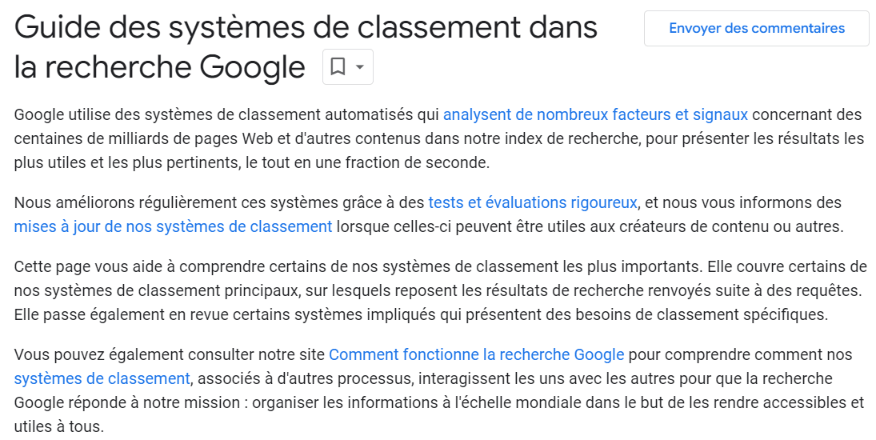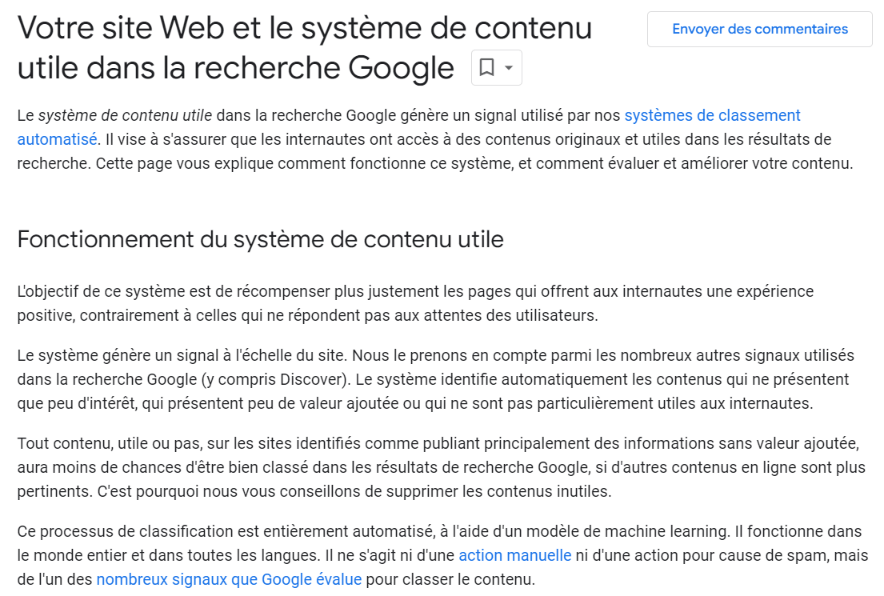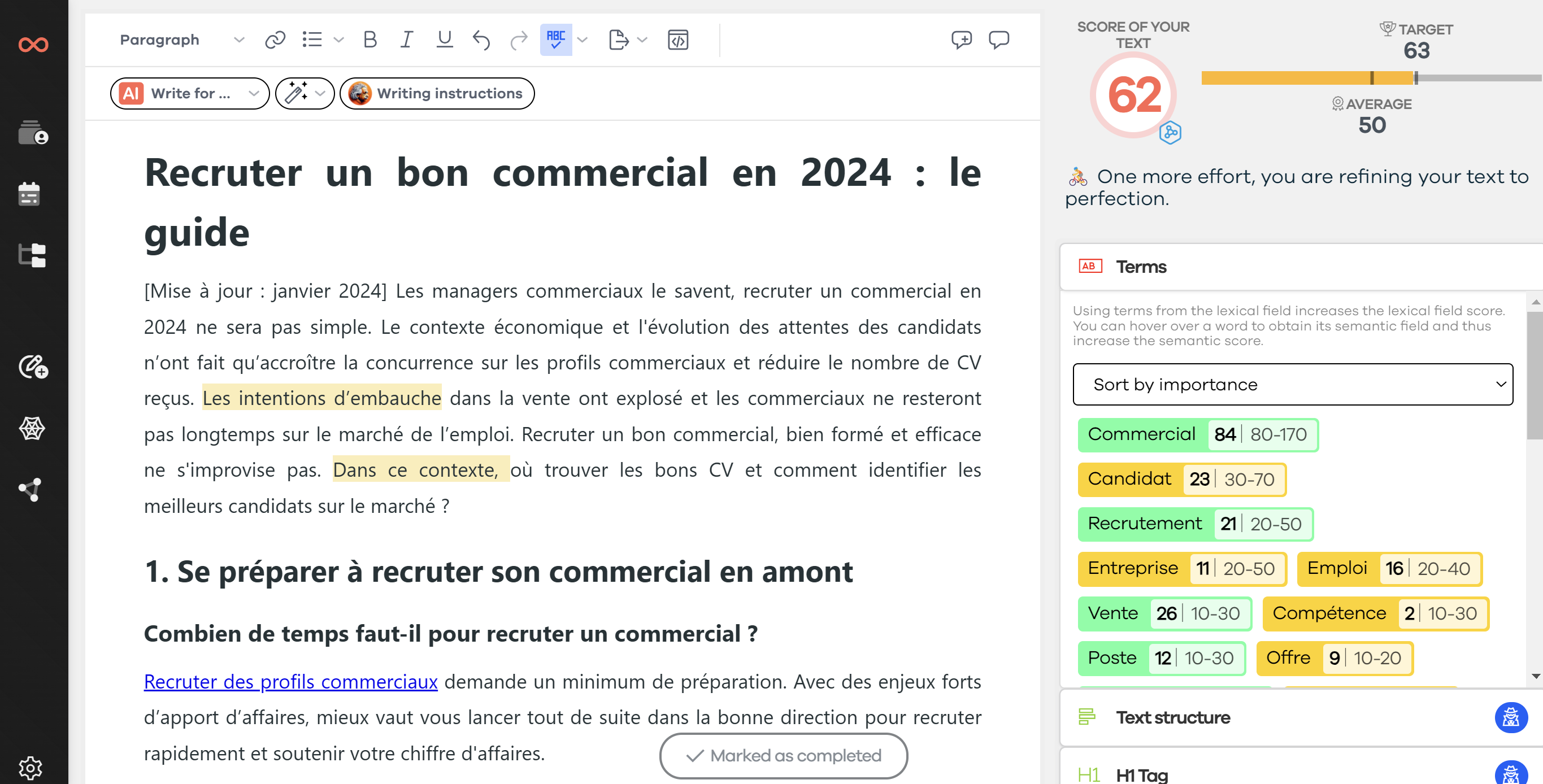Are you discouraged by the hours spent writing content and improving your site while it is not visible on the first page of Google? Do you want to know the most important factors to optimize to climb to the top of the SERP? By publishing a ranking systems guide, Google has given a great gift to the SEO community. Here's everything you need to know to attract more traffic to your web pages!
🚀 Quick read: what you will learn in this article
Recently, Google has published two SEO guides that you absolutely need to know:
- Guide to ranking systems in Google Search
- Useful content system in Google Search
Also discover the 19 ranking systems currently used and the 6 updates that are now obsolete (not that their principle is outdated, but simply because these functions have been added to more recent updates).
Finally, a little reminder on how algorithms work is never superfluous. (Re)discover the 3 steps to know before optimizing your website!
📖 SEO Guide: Google reveals how its algorithms work
In November 2022, Google announced the publication of a guide to ranking systems in Google Search.[1] This document explains what ranking systems are currently used by the search engine. Even though natural SEO experts will certainly not learn anything new, this source of information is very instructive for novices and enthusiasts.
In addition, an SEO glossary is provided to help understand the terms frequently used in the field. This vocabulary is very useful to know for anyone wishing to improve the organic ranking of their website! Finally, the Mountain View Giant unveils the current ranking systems and those that are no longer relevant (this point is detailed in the next chapter).[2]
To complement this essential source of information, Google then published a page dedicated to the update known as "Helpful Content Update".[3] This system, based on machine learning, operates at the website level. That is, if certain malfunctions are detected on certain pages, the entire site will be penalized.
By doing so, Google allows the entire SEO community to better understand how search algorithms work. Thus, we can properly optimize our sites to, first, please our readers and, second, hope to improve our ranking on the most used search engine results page in France.
💡 Google's algorithms to know
As mentioned earlier in this article, Google provides a list of current algorithms and those that are obsolete. Even though you can find these elements directly in their guide, I offer here a summary of this crucial information to know.
Current ranking systems
Here is the list of algorithms that are used today. These ranking systems are essential to know if you want to improve the visibility of your site on Google's results pages.
- Google BERT: The AI analyzes word combinations to understand the user's intent.
- Crisis Information: Google distinguishes here personal emergencies (suicide, assault, etc.) and SEO alerts (natural disasters, large-scale crises, etc.).
- Deduplication: Purification of results to not propose two similar contents in the SERP.
- Exact domain name match: The system does not favor domain names that exactly match a specific query.
- Freshness of information: Depending on the news and the type of search, Google may favor the most recent information.
- Useful content: Texts must be primarily written for readers and provide relevant information.
- PageRank: The analysis of external links allows Google to identify the pages that best match the search intent.
- Local information: Display of local information sources in the "Featured" and "Local News" sections.
- Google MUM: This artificial intelligence is able to understand and generate language. This improves the results displayed for certain specific cases.
- Neural matching: Google is able to make concepts in the queries and the pages proposed.
- Original content: When information is repeated in many web pages, the first publication is favored.
- Content removal requests: A site facing many content removal requests (for legal or personal reasons) is downgraded.
- Page Experience: The comfort of Internet users is a priority for Google. Thus, websites meeting this criterion are favored.
- Passages or sections of content: The AI ranks the passages of a web page to better understand its relevance.
- Product reviews: Based on this information, Google rewards quality content.
- Rankbrain: This system allows understanding the existing link between different words, and thus displaying the most relevant results, even if the terms used are not the same.
- Reliability of information: The authority of pages is crucial to display quality content.
- Diversity of sites: In order to offer a good diversity of information, a maximum of 2 pages per site is displayed in the SERP.
- Spam detection: The systems used allow for efficient sorting and display only the most useful and relevant results.
Obsolete ranking systems
Here is the list of systems that are no longer used by Google. Note that they have not completely disappeared, but they have simply been integrated into more recent Google algorithms.
- Hummingbird: The first algorithm allowing Google to give meaning to words. Note that if Rankbrain is not active, this system seems to still be used.
- Mobile adaptation: The sites best adapted to mobile display were favored. This is still the case, but it is now part of "Page Experience".
- PageSpeed: Loading speed (especially for mobile versions) is also included in "Page Experience".
- Panda: Thanks to this algorithm, original and high-quality content has been favored since 2011.
- Penguin: Announced in 2012, this marked the beginning of Google's fight against spam.
- Secure sites: An HTTPS site has an advantage over an HTTP site. Once again, this is part of the "Page Experience" ranking system.
🧑🏫 The basics of Google's algorithms

Knowing Google's ranking systems is a great thing. But understanding how algorithms work is fundamental if you want to boost your SEO. That's why I explain here the basics to know before you start optimizing your site.
In order to offer the best results, search engines proceed in 3 steps: crawling, indexing, and ranking.
1. Crawling
Google browses the Web in search of new pages. Note that more than 800,000 sites are created every day! Therefore, this work can be long and tedious, which explains why a new site is not instantly present on the results pages.
To help Google find your new pages, placing links to your content is then crucial. Whether through internal linking or link building, you thus allow robots to find your pages more quickly.
2. Indexing
Indexing robots analyze the content of the web pages found. They focus mainly on texts, tags, and media (photos and videos). They then store these pages in a huge database called "index".
To send a good signal to Google, you must therefore properly structure your pages. To do this, think about organizing your page layout, your texts, and your titles well. The quality and relevance of your content are also crucial if you want to be displayed in the top positions of the results page.
3. Ranking
This is the positioning of results in the SERP. Once the search has been performed, the algorithms browse the index to find the pages that best meet the user's intent.
Depending on the keyword and the previously mentioned criteria, the ranking of the proposed links is then determined. If you didn't know, barely 2% of Internet users go to the second page, and more than 60% click on the first 3 results displayed. That's why you should not neglect anything if you want to attract free traffic to your site!
For commercial and security reasons, Google cannot reveal the exact functioning of its algorithms. Moreover, no one knows exactly this information (engineers work separately on a portion of the algorithm)! However, the leader of search engines is not stingy with good advice for anyone wishing to optimize their website.
By respecting the ranking systems listed in their SEO guide and doing good SEO monitoring, you put all the odds in your favor!
Did you know all these ranking criteria? Is your site and your content perfectly optimized? It's your turn! Check each of these elements and boost your visibility without delay!
🙏 Sources used to write this article
[1] https://developers.google.com/search/blog/2022/11/introducing-guide-to-ranking-systems?hl=fr
[2] https://developers.google.com/search/docs/appearance/ranking-systems-guide?hl=fr
[3] https://developers.google.com/search/updates/helpful-content-update?hl=fr
Need to go further?
If you need to delve deeper into the topic, the editorial team recommends the following 5 contents:



